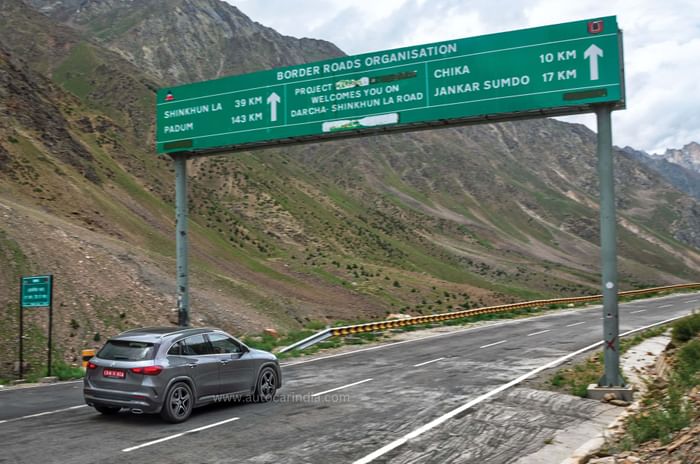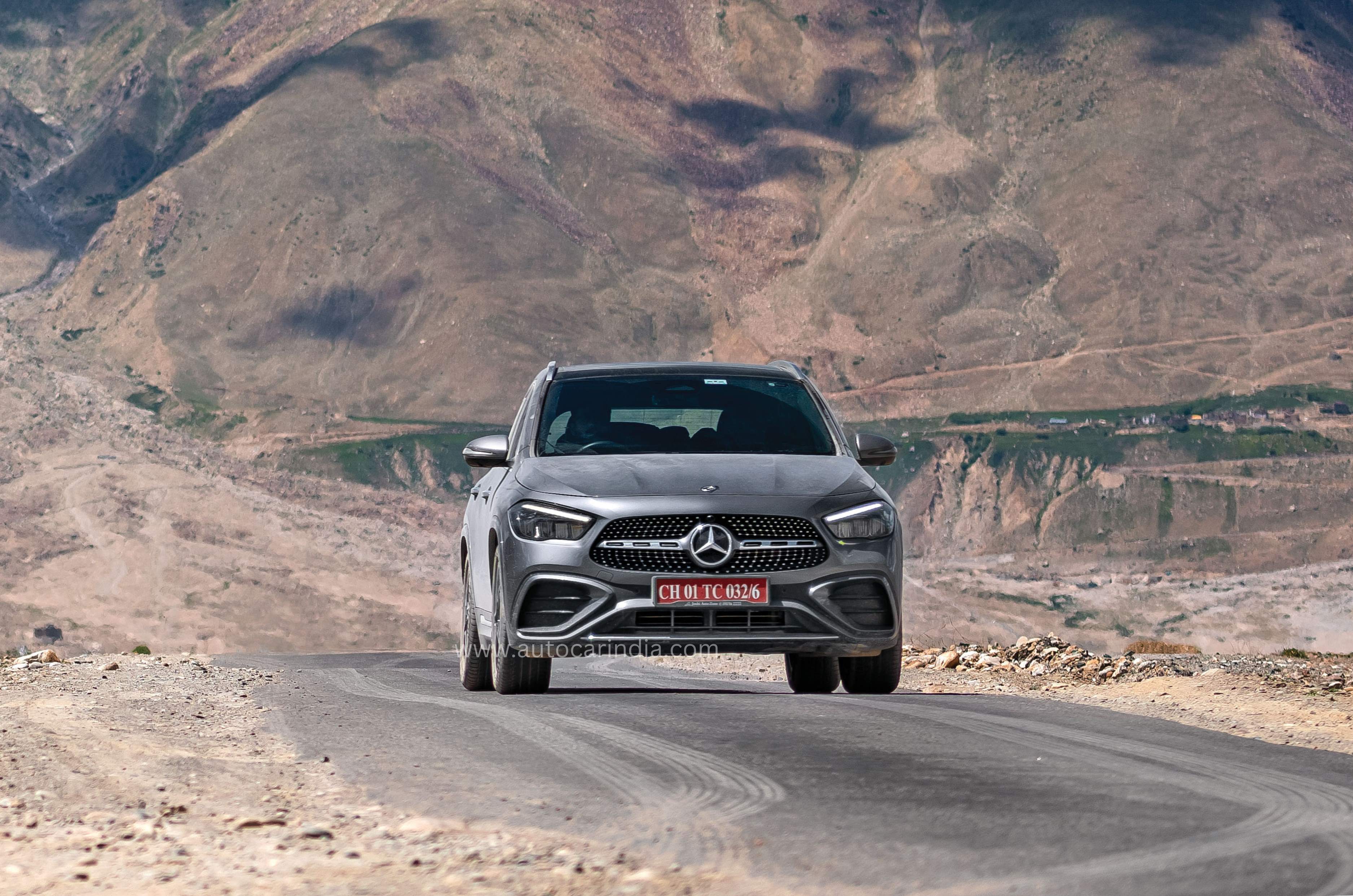The mountains are calling, and I must go’ is probably one of the most frequently used quotes to pack your ‘Decathlon’ wardrobe and head to the Himalayas. Of course, the complete quote is: The mountains are calling, and I must go, and I will work on while I can, studying incessantly. But nearly everyone dwells on the first bit. For me, even the stunning Instagram posts and epic drone shots of snow-capped peaks are no bait, but my colleagues promised me this trip would change my mind about the mountains.
This wouldn’t be the run-of-the-mill ‘Leh-Ladakh’ trip. Because I was headed to the sparsely explored but exceptionally stunning region of Zanskar. More specifically, to experience some of the absolutely mesmerising sights. The Gonbo Rangjon mountain, Phukthar Monastery and the Drang-Drung glacier near the Pensi La Pass in Kargil.

Sounds challenging, but what’s a trip to the Himalayas without a bit of a challenge? That said, the tough job would actually be for the Mercedes-Benz GLA 220d 4MATIC.
Yes, a baby SUV, but one that has all-wheel drive, a torquey diesel engine, dedicated off-road mode and plenty of ground clearance. Sure, there are more hardcore SUVs in the Mercedes portfolio, but anyone who’s traversed the Himalayas knows the value of comfort along with the necessity of off-road prowess. So, with the GLA on a drive like this, I would not spend half my time getting out and straightening my back and would actually enjoy the journey.
I started off in the early hours to escape the bustle of Leh via the Shingo La Pass. Despite its reputation as one of the most arduous passes of the Himalayas, it is stunning to drive on.
The beautiful landscape, along with the well-paved ribbon of tarmac, made for an exciting drive. As I engaged Sport mode, the compact and nimble characteristics of the GLA came to life, and we made good time through the twisties.
The first overnight halt in Zanskar was in the quaint village of Purne. However, before I got there, a visit to Gonbo Rangjon was imperative. Gonbo Rangjon or ‘Gumbo Ranjan’, as it is referred to by the locals, means ‘God’s Mountain’. It stands alone with flat land around it, making it impossible to miss. And the best bit is that it is the first epic monument you see as you enter Zanskar. Can’t have a better welcome!
Next stop – Phukthar Monastery. The Himalayas may boast of a number of stunning monasteries, but personally, the Phuktal – as it’s also known – is the most special of them. Built around a natural cave, which is believed to have been visited by numerous sages, scholars, translators and monks around 2,550 years ago, the monastery sprouts from the cliff as though it is part of it. However, while the visuals are stunning, you need to put in a fair bit of work to get there.
Unfortunately, the road leading to the monastery is not motorable, and you need to trek through crests and troughs while trying to maintain your balance. Sure, the scenery more than makes up for it, but the true reward is when you reach the top of the monastery and have that first sip of butter tea. As I relaxed and tried to get life back into my legs, a group of young monks made their way to class. The Phuktal Gompa is also the Gelug School of Tibetan Buddhism and has been operational since the early 15th century. No technology, no internet and yet, some of the best education. As I made my way back under the hot sun that was burning my skin, the thought of the cool cabin of the Merc was the biggest motivating factor. Once I made it, the AC was on full blast, and off I went in search of a place far cooler – the mega-glacier called Drang-Drung.
Before I could feel the ice-cold breeze of the Drang-Drung glacier, the route would take me to another historical site called Padum near the main town of Zanskar. It’s a small town with a population of around 2,000 people, but it has incredible stone carvings of Buddhas, popularly known as Gyalwa Rig Nga – the Sanskrit equivalent of Five Dhyani Buddhas. The carvings date back to the 8th century and are a must-visit just to appreciate the fine details.
Zanskar sure has its share of historical and artistic brilliance, but the road network has always been a bit of a hurdle for explorers. Even experienced and trained mountaineers used to find it difficult to traverse through Zanskar, but all that is slowly changing. There are new highways being constructed with the same “no compromise” attitude of the BRO. However, it is still a work in progress. So, while I enjoyed the GLA on smooth asphalt, flicking through the paddle shifters, every once in a while, I would have to jump on the brakes as the road ahead would vanish. I was thankful for picking the GLA 220d, which comes with chunky tyres. The ride quality, as a result, was more than comfortable, and the seat kinetics ensured I never had a stiff back despite long driving hours. My choice of steed was clearly spot-on.
The last part of my trip was arguably the most challenging. Unexpected landslides, road works and challenging terrain slowed me down significantly. However, in typical Ladakhi fashion, after many kilometres of off-road misery, there was asphalt again.
With the GLA in its stride and Pensi La in sight, I would reach Drang-Drung in just a matter of time. The best spot to view the glacier is a viewpoint as you drive up after Pensi La. As I parked up along the viewing gallery, nothing had prepared me for the sight. The second-largest glacier after Siachen, Drang-Drung is majestic in its own right. Wind speed is high, and its sheer size is almost mind-numbing.
This is what you call nirvana. Sure, the Himalayas have their fair share of tourist spots like Leh, Pangong and Nubra Valley, but if you want to transcend into another realm, nothing comes close to Zanskar. While I was not fully on board with the mountains, I’m glad I answered the call. And I would strongly recommend you visit Zanskar, too.
Also see:
300th issue special: Unforgettable 300km road trips
Mercedes-Maybach EQS SUV review: Pinnacle of luxury in green clothes

